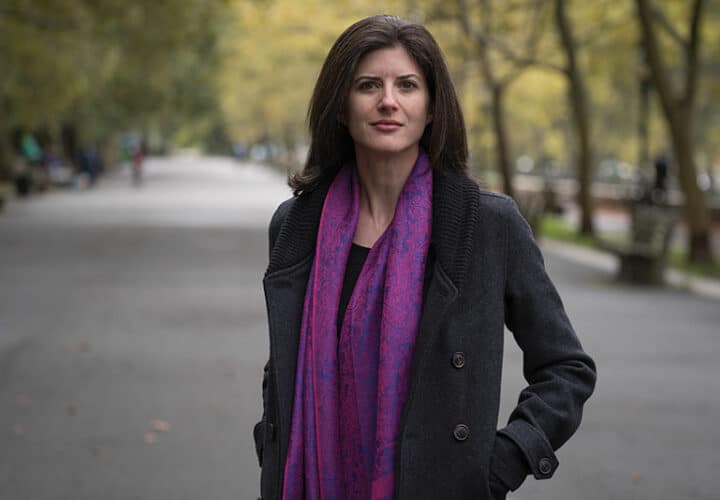Image: Lynn Casteel Harper, by Travis Tanay
Lynn Casteel Harper, author of On Vanishing: Mortality, Dementia, and What It Means to Disappear (Catapult, 2020) and minister of older adults at The Riverside Church in New York City, looks ahead to a possible world in which the “dementia-as-unmitigated-tragedy” narrative fades, highlighting visionary efforts toward a powerfully reimagined and wider framing of the disease that is “less focused on brain function and more concerned with shared humanness.”
Stock photos of dementia usually depict an old person, alone and forlorn, staring out a window or holding head in hands. Sometimes their faces are half faded or fading, sometimes their heads are blowing away like autumn leaves off a tree, always their affect is sad or flat. Everyday speech — our “stock” descriptions of dementia—also characterize people with the condition as “gone,” “disappearing,” “vanishing in plain sight,” possessing “empty” or “vacant” stares; their illness is “stealing,” “robbing,” or “hijacking” them, as they suffer the “long goodbye,” the “longest funeral,” the “death that leaves the body behind.” Inexorable loss, dread, and horror shape public perceptions of dementia — a condition imagined as steadily exterminating the person as person. Rather than a set of symptoms related to cognitive loss—and one among many challenging conditions that humans face — dementia takes on an extraordinary charge of negativity and fatalism.
This framework, which envisions people as “gone” before they are dead, reflects and reinforces a culture that highly stigmatizes brain disease — a stigma that fuels negative treatment. People with dementia are more vulnerable to being abused and neglected, improperly medicated and restrained, financially drained (just to get necessary care), socially abandoned, infantilized or ignored, displaced from their homes, and segregated from the rest of the community. Their caregivers go underpaid, undertrained, and poorly protected. This deeply deficient set-up has proven unspeakably deadly in the pandemic. Nearly one third of coronavirus deaths — over 182,000 people — across the United States are linked to nursing homes, where nearly half of residents have a diagnosis of Alzheimer’s disease or other dementias. A recent study that analyzed hospital data in the United States revealed the six-month mortality risk for patients with dementia and COVID-19 approached 21 percent — an alarming death rate that reflects the priorities and prejudices of a culture that readily views older adults with dementia as less deserving of resources than other groups.
Even though our society has compromised people’s ability to survive, let alone thrive, with dementia, dementia does not have to mean mistreatment, isolation, premature death, or suffering.
Nursing homes don’t have to be soul-sapping death traps. Home care does not have to be prohibitively expensive. Neighborhoods don’t have to be inaccessible to those with cognitive disabilities. A dementia diagnosis does not have to entail loss of community, purpose, or joy. But too often, people must find ways to flourish despite, not because of, prevailing attitudes and systems. This must change — and, I believe, is changing.
This framework, which envisions people as “gone”
before they are dead, reflects and reinforces a culture
that highly stigmatizes brain disease —
a stigma that fuels negative treatment.
In September 2020, Reimagine Dementia: A Coalition for Justice was formed, an international grassroots group of dementia activists and allies, which is pulling together transformative efforts, ideas, and resources into one movement to shift the conversation about aging and dementia in an inclusive, creative, and just direction. People from around the world have signed on, collectively sensing an urgency to transform broken care systems in the wake of COVID-19’s ongoing devastation. As of this writing, there are over 500 members of the coalition; this burgeoning global movement gives me hope.
Visionary individuals and groups are charting fresh paths, aware of how unsustainable and unjust our current set-up is. They are not promoting new techniques or discrete innovations for “sprucing up” fundamentally flawed care systems. Rather, they are offering powerful reimaginings of dementia — and of human community more broadly — that eschew individualistic, ableist views of what makes us human, moving beyond a narrow focus on disease and defect.
People like gerontologist Anne Davis Basting are transforming aging and dementia care through arts-based intergenerational collaborations. Emphasizing creativity and imagination over memory, Basting believes nursing homes can become vibrant cultural centers. Her initiatives, such as the Penelope Project — a multi-year collaboration between a local university, theatre, and nursing home that created a theatre production based on the Odyssey — prove such a vision is possible. Not simple additions to the activities calendar, these endeavors require systemwide buy-in, mutual processes of creation (doing with not for people), and meaningful, sustained engagement with a wider community.
Visionary individuals and groups are charting fresh paths,
aware of how unsustainable and unjust our current set-up is.
Other arts-based dementia advocates — such as actor Karen Stobbe, a pioneer in utilizing improvisational acting in dementia care, dancer Magda Kaczmarska, a teaching artist focused on creative movement and brain health across the lifespan, and filmmaker Chris Bravo whose documentaries prioritize the voices and perspectives of people living with dementia — are also building caring, creative communities that emphasize the artistic gifts and abilities of people living with dementia. Therapist and playwright Mary Fridley and retired physician Susan Massad offer workshops on the joy of dementia — an idea they say outrages some people, but, more often, inspires participants to take a more playful, present, and improvisational approach to dementia (and to life more generally).
Activist physicians, such as Al Power, Bill Thomas and Peter Whitehouse, are reframing dementia, old age, and care beyond narrow rubrics of pill regimens and diagnoses, arguing that these frameworks are limiting and even counterproductive. Power’s book Dementia Beyond Disease castes a vision for dementia inclusive communities. Thomas’s Greenhouse Project, an alternative to nursing homes, builds intimate, affordable homes in which older residents can live out their days with dignity. A proponent of holistic approaches to brain health, Whitehouse and his wife Catherine Whitehouse created Intergenerational Schools based in Cleveland to offer public, multi-age spaces where elders and children can learn together.
Groups like Dementia Alliance International and Dementia Action Alliance are composed of and led by people living with dementia. Like other disability-rights organizations, they assert “nothing about us without us” as they seek to destigmatize dementia through visibility, education, and political advocacy. Some activists, such as Daniella Greenwood and Kate Swaffer, who heads Dementia Alliance International, are pushing for a human rights framework in dementia care, pointing to the United Nations Convention on the Rights of Persons with Disabilities as an important standard for reimagining systems of care. They argue that ensuring and protecting people’s inalienable (and legal) rights as human beings — to, say, be free from restraints including locked units — should be foremost in care environments. Caregiver advocacy groups, such as Ai-jen Poo’s Caring Across Generations, are pushing for massive public investment to support community-based care across the lifespan, including the provision of living wages for professional and familial caregivers.
The eagerness for a wider framing of dementia, less focused on brain function and more concerned with shared humanness, including spiritual dimensions, extends beyond activists, experts, and self-identified allies. A woman in Oregon told me how much she enjoys the company of her sister who has Alzheimer’s and how she can’t wait for the restrictions to lift so she can spend more time with her. A woman in Vermont shared how at the end of her father’s life, never assuming he was “already gone,” she named all the people who loved him and played Chopin. He opened his eyes before taking his final breaths. A daughter in South Carolina sent me a video of her father’s memorial service. In her eulogy, she speaks as vividly and personally about her father’s final years with dementia as she does the other eras of his life, making clear that he was fully alive to the end. These stories, a few among many, pushback against the “dementia-as-unmitigated-tragedy” narrative that fuels dehumanization, segregation, and institutionalization of people living with the condition. They reveal a longing for meaning, connection, and hope beyond searches for cures or strategies for coping.
The usual unimaginative, fatalistic approaches
to the lives of people with dementia and
their carers just won’t cut it anymore.
The usual unimaginative, fatalistic approaches to the lives of people with dementia and their carers just won’t cut it anymore. While I know entrenched mentalities and systems die hard, I am encouraged by what I’m seeing, hearing, and getting to be a small part of. I am chastened by the loss of life that has pushed us to this point, yet I find hope in a growing movement committed to building a world in which the “stock” images of dementia include people together, an intergenerational community enjoying a broad spectrum of experiences and emotions, with heads held high. No one is made to fade away or suffer.
Lynn Casteel Harper is the author of On Vanishing: Mortality, Dementia, and What It Means to Disappear (Catapult, 2020), and currently serves as the minister of older adults at The Riverside Church in New York City.




So inspiring and a needed reminder to keep advocating, learning and sharing.
Great read thanks for thinking and caring about those who seem to just be forgotten.
especially those lost to covid that statistic really stuck out
Jay